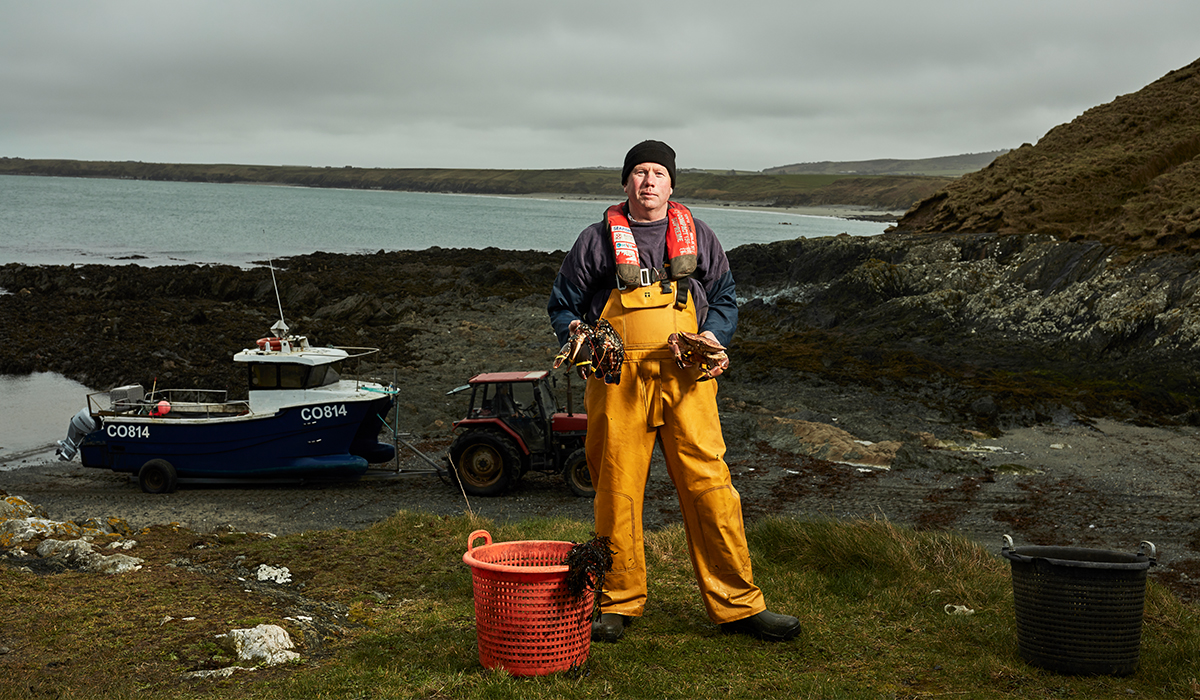A photoshoot for the Department for Environment, Food & Rural Affairs on a windy beach in North Wales may not be the place you’d expect a lockdown-beating business idea to be hatched. But with export routes shut down, fisherman Sion Williams and photographer Jude Edginton formed an unlikely alliance to save the lobster season and build a more resilient fisheries business.
Around 90% of the lobsters caught in Welsh waters are exported to China and Europe1. With Sion unable to reach these markets and Jude finding photographic commissions cancelled as lockdown loomed, the pair agreed on a classic business pivot. Jude promised to use his experience of marketing and storytelling to help sell Sion’s catch directly to consumers in London.
The agreement saw the creation of new business Lockdown Lobsters and demonstrates how seeking out new partnerships and different skills can help businesses to survive and thrive in tough times. While Sion, a proponent of sustainable fisheries, provided the lobsters, London-based Jude set about marketing them on What’s App, building a website and developing a plan to get the lobsters from the Irish Sea to dining tables in the capital within a few hours.
Marketing on What’s App
During an initial three-week period while the lobsters were being caught, Jude, whose regular job involves taking portraits of people ranging from Boris Johnson to Boris Becker and from Little Mix to Gogglebox stars, approached friends and business contacts in a What’s App campaign – some of those contacts were celebrity chefs and food critics. The approach was a success and by the time Jude made his first run from Wales to five drop-off points in London, socially distanced queues were waiting for the deliveries.
After the first three weekly deliveries there was a natural break when the lobsters shed their shells and fishing stopped. Jude used the time to develop the website and refine the operation, which now uses Zip cars for rapid delivery across the city. During this period his initial focus on business contacts paid off when a food and wine writer, who had received some of the lobsters, wrote a three-page article on the experience in the FT magazine – helping them to sell-out the catch for the next six weeks.
Sion explains: “The lockdown due to the virus had a devastating effect on my business. Firstly, the merchants I sell a high percentage of my catch to stopped buying as their markets in Europe and Asia had closed, with no guarantees that they would be buying for the next five weeks, possibly five months. On top of this the local shellfish processor and restaurant closed due to the requirements of the lockdown.
“Through Lockdown Lobsters I was able to carry on fishing and earning a living. I have also sold all my lobsters within the UK, reducing air miles and carbon footprint. Furthermore, we have established a connection with our customers by selling our story and giving our customers provenance of their seafood. I have learned that there is a market within the UK for our lobsters, it is a matter of making the customer aware of the availability of the high-quality seafood that is on their doorstep and getting it to them.”
Changing business models
Associate Professor and Head of Enterprise Education at Kingston University Martha Mador cited Lockdown Lobsters as an example of how some entrepreneurs were changing their business models to build resilience in the face of challenges such as the Covid-19 pandemic and Brexit. She explains that new relationships, greater use of digital and finding new ways to reach customers are all ingredients of the resilience that is needed for companies to thrive.
To help your business become more resilient, you need to find partnerships and supportive networks where ideas and concerns can be shared, she explains. You should also aim to use digital technology as much as possible, whether that’s how you interface with your customers, how they purchase your products or how you communicate. You can also look for new markets and prospect for clients digitally. New market opportunities can be tested easily with targeted advertising on Facebook and LinkedIn.
And make sure that you are managing your website so that it can easily be found in searches, says Martha. You could also consider developing a marketing app to make it simpler for customers to interact with you and buy your products on their phones. Another way to make your business more resilient is to put your products and services onto platforms which attract more customers, such as Etsy, eBay, Amazon or the many more specialist sites.
Martha explains: “You need to do something new which addresses this online world which we find ourselves in and make something of it. So, you need to redesign your services or your products, reconsider how you are getting to people, how you are reaching your customers and maybe pivot into different businesses or business models which are more heavily digital than previously. And I also think partnering and finding new people to work with and to develop new ideas and services with is important.”
Lockdown Lobsters is going from strength-to-strength and has recently begun delivering lobsters from Bridlington in Yorkshire, while fishermen in Inverness have sent lobsters on the overnight sleeper train to London to be distributed across the city.
The opinions expressed by third parties are their own and not necessarily shared by St. James’s Place Wealth Management.
1. www.fishingnews.co.uk, 19 March 2018




